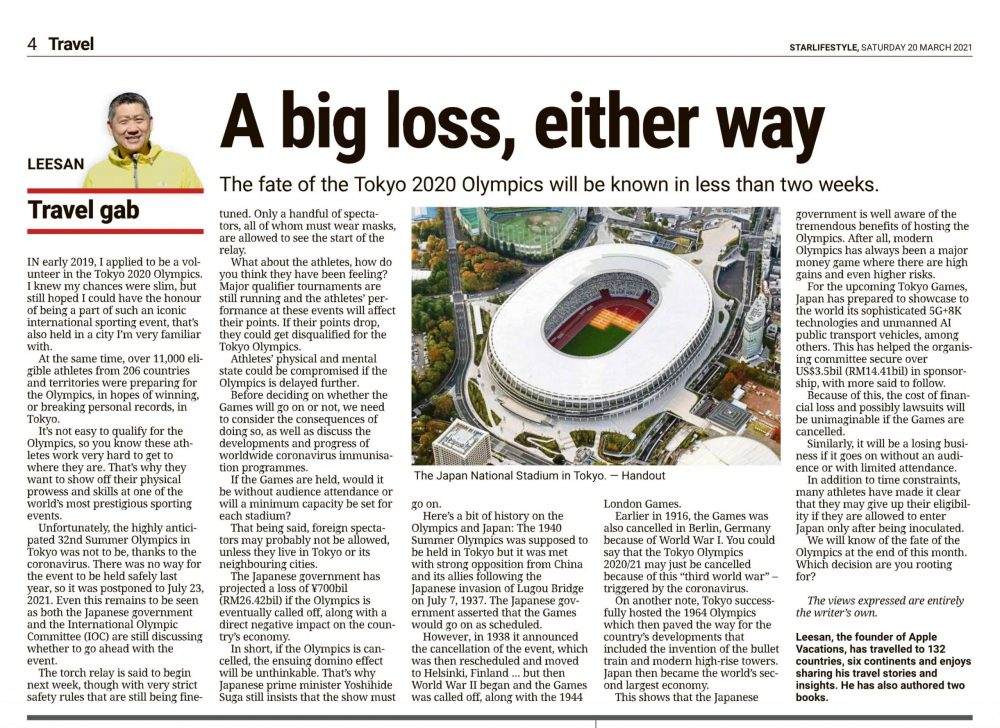Even this remains to be seen as both the Japanese government and the International Olympic Committee (IOC) are still discussing whether to go ahead with the event.
A big loss, either way – by leesan
The fate of the Tokyo 2020 Olympics will be known in less than two weeks.

The Japan National Stadium in Tokyo-Handout.

IN early 2019, I applied to be a volunteer in the Tokyo 2020 Olympics. I knew my chances were slim, but still hoped I could have the honour of being a part of such an iconic international sporting event, that’s also held in a city I’m very familiar with.
At the same time, over 11,000 eligible athletes from 206 countries and territories were preparing for the Olympics, in hopes of winning, or breaking personal records, in Tokyo.
It’s not easy to qualify for the Olympics, so you know these athletes work very hard to get to where they are. That’s why they want to show off their physical prowess and skills at one of the world’s most prestigious sporting events.
Unfortunately, the highly anticipated 32nd Summer Olympics in Tokyo was not to be, thanks to the coronavirus. There was no way for the event to be held safely last year, so it was postponed to July 23, 2021. Even this remains to be seen as both the Japanese government and the International Olympic Committee (IOC) are still discussing whether to go ahead with the event.

The torch relay is said to begin next week, though with very strict safety rules that are still being fine-tuned. Only a handful of spectators, all of whom must wear masks, are allowed to see the start of the relay.
What about the athletes, how do you think they have been feeling? Major qualifier tournaments are still running and the athletes’ performance at these events will affect their points. If their points drop, they could get disqualified for the Tokyo Olympics.
Athletes’ physical and mental state could be compromised if the Olympics is delayed further.
Before deciding on whether the Games will go on or not, we need to consider the consequences of doing so, as well as discuss the developments and progress of worldwide coronavirus immunisation programmes.
If the Games are held, would it be without audience attendance or will a minimum capacity be set for each stadium?
That being said, foreign spectators may probably not be allowed, unless they live in Tokyo or its neighbouring cities.
The Japanese government has projected a loss of ¥700bil (RM26.42bil) if the Olympics is eventually called off, along with a direct negative impact on the country’s economy.
In short, if the Olympics is cancelled, the ensuing domino effect will be unthinkable. That’s why Japanese prime minister Yoshihide Suga still insists that the show must go on.
Here’s a bit of history on the Olympics and Japan: The 1940 Summer Olympics was supposed to be held in Tokyo but it was met with strong opposition from China and its allies following the Japanese invasion of Lugou Bridge on July 7, 1937. The Japanese government asserted that the Games would go on as scheduled.
However, in 1938 it announced the cancellation of the event, which was then rescheduled and moved to Helsinki, Finland … but then World War II began and the Games was called off, along with the 1944 London Games.
Earlier in 1916, the Games was also cancelled in Berlin, Germany because of World War I. You could say that the Tokyo Olympics 2020/21 may just be cancelled because of this “third world war” – triggered by the coronavirus.

Most likely oversea fans to be barred from Tokyo Olympics. If so, no choice has to be made to claim for ticket refund.
On another note, Tokyo successfully hosted the 1964 Olympics which then paved the way for the country’s developments that included the invention of the bullet train and modern high-rise towers. Japan then became the world’s second largest economy.
This shows that the Japanese government is well aware of the tremendous benefits of hosting the Olympics. After all, modern Olympics has always been a major money game where there are high gains and even higher risks.
For the upcoming Tokyo Games, Japan has prepared to showcase to the world its sophisticated 5G+8K technologies and unmanned AI public transport vehicles, among others. This has helped the organising committee secure over US$3.5bil (RM14.41bil) in sponsorship, with more said to follow.
Because of this, the cost of financial loss and possibly lawsuits will be unimaginable if the Games are cancelled.
Similarly, it will be a losing business if it goes on without an audience or with limited attendance.
In addition to time constraints, many athletes have made it clear that they may give up their eligibility if they are allowed to enter Japan only after being inoculated.
We will know of the fate of the Olympics at the end of this month. Which decision are you rooting for?
The views expressed are entirely the writer’s own. Leesan, the founder of Apple Vacations, has travelled to 132 countries, six continents and enjoys sharing his travel stories and insights. He has also authored two books.

The views expressed are entirely the writer’s own. Leesan, the founder of Apple Vacations, has travelled to 132 countries, six continents and enjoys sharing his travel stories and insights. He has also authored two books.

Published in STAR 2, 20 Mac 2021
全球超过80000家酒店,Apple101助您轻松订房,出行无忧,绝对优惠价。入住期间付款,多数客房可免费取消!











